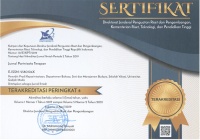Stakeholder Roles in the Rural Tourism Area Life Cycle of the Wisata Tani Betet, Nganjuk Regency
Bagus Satrio Nugroho(1*), Sulikah Asmorowati(2)
(1) Universitas Airlangga
(2)
(*) Corresponding Author
Abstract
The development of rural tourism in rural areas deserves attention due to its various advantage. In the Nganjuk Regency there is rural village destination which has received various awards, namely the Wisata Tani Betet. This study aims to describe the identification of stakeholders and the role of stakeholders in the development of Wisata Tani Betet. The research method is descriptive qualitative with data collection techniques of interviews using purposive techniques and supporting informants using snowball techniques, field observations and documentation studies. The theory used is based on stakeholder classification which includes primary, key and secondary stakeholders and stakeholder roles which includes policy creators, coordinators, facilitators, implementers and accelerator. In addition to describing the stakeholder role identified based on the Tourism Area Life Cycle (TALC) stages which is includes the exploration stage, the involvement stage, the development stage, the consolidation stage, the stagnation stage and the decline stage. The results show that Wisata Tani Betet has gone through 3 stages of the Tourism Area Life Cycle (TALC), which is the exploration stage, the involvement stage and the development stage. At each of these stages, stakeholders have carried out their respective roles, beside that local leadership and social capital owned by the Betet Village Government and Pokdarwis Regul, are factors that accelerate the development of tourism destinations. On the other hand, the lack of funding and the competencies of human resources is a barrier for tourism destinations to reach the next stage.
Keywords
References
Arens, P., & Brouthers, K. D. (2001). Key stakeholder theory and state owned versus privatized firms. In Source: MIR: Management International Review (Vol. 41, Issue 4). Bojanic, D. (2005). Tourist area life cycle stage and the impact of a crisis. ASEAN Journal on Hospitality and Tourism, 4(2), 139–150. Brugha, R. (2000). Stakeholder analysis: a review. Health Policy and Planning, 15(3), 239–246. https://doi.org/10.1093/heapol/15.3.239 Butler, R. W. (2006). The concept of a tourist area cycle of evolution: implications for management of resources. In R. W. Butler (Ed.), The Tourism Area Life Cycle, Vol. 1: Applications and Modifications (1st ed., Vol. 1, pp. 3–12). Channel View Publications. Cadar, O., & Badulescu, D. (2015). Entrepreneur, entrepreneurship and intrapreneurship. A literature review. Cahyo, Nugroho, H., & Zauhar, S. (2014). Koordinasi pelaksanaan program pengembangan kawasan agropolitan di Kabupaten Nganjuk. J-PAL, 5(1). Clarkson, M. E. (1995). A stakeholder framework for analyzing and evaluating corporate social performance. Academy of Management Review, 20(1), 92–117. https://doi.org/10.5465/amr.1995.9503271994 Creswell, J. W., & Creswell, J. D. (2017). Research Design: Qualitative, Quantitative, and Mixed Methods Approaches. Sage publications. Fleischer, A., & Tchetchik, A. (2005). Does rural tourism benefit from agriculture? Tourism Management, 26(4), 493–501. https://doi.org/10.1016/j.tourman.2003.10.003 Freeman, R. E., Harrison, J. S., Wicks, A. C., Parmar, B. L., & De Colle, S. (2010). Stakeholder theory: The state of the art. Getz, D. (1992). Tourism planning and destination life cycle. Annals of Tourism Research, 19(4), 752–770. Haven‐Tang, C., & Jones, E. (2012). Local leadership for rural tourism development: a case study of Adventa, Monmouthshire, UK. Tourism Management Perspectives, 4, 28–35. https://doi.org/10.1016/j.tmp.2012.04.006 Komppula, R. (2016). The role of different stakeholders in destination development. Tourism Review, 71(1), 67–76. https://doi.org/10.1108/TR-06-2015-0030 Lane, B. (2009). Rural tourism: an overview. In T. Jamal & M. Robinson (Eds.), The SAGE Handbook of Tourism Studies (pp. 354–370). SAGE Publications. Lekaota, L. (2015). The importance of rural communities’ participation in the management of tourism management: A case study from Lesotho. Worldwide Hospitality and Tourism Themes, 7(5), 453–462. Magno, F., & Cassia, F. (2021). Effects of agritourism businesses’ strategies to cope with the COVID-19 crisis: The key role of corporate social responsibility (CSR) behaviours. Journal of Cleaner Production, 325, 129292. Malek, A., Carbone, F., & Alder, J. (2017). Community engagement, rural institutions and rural tourism business in developing countries. In A. Oriade & P. Robinson (Eds.), Rural Tourism and Enterprise: Management, Marketing and Sustainability (pp. 145–157). CABI. Mason, P. (2020). Tourism impacts, planning and management. Routledge. Merinero-Rodríguez, R., & Pulido-Fernández, J. I. (2016). Analysing relationships in tourism: a review. Tourism Management, 54, 122–135. https://doi.org/10.1016/j.tourman.2015.10.010 Miles, M., Huberman, M., & Saldaña, J. (2013). Qualitative Data Analysis: A Methods Sourcebook. In Zeitschrift fur Personalforschung (Vol. 28). Radović, G., Petrović, M. D., Demirović Bajrami, D., Radovanović, M., & Vuković, N. (2020). Can proper funding enhance sustainable tourism in rural settings? Evidence from a developing country. Sustainability, 12(18), 7797. Rosalina, P. D., Dupre, K., & Wang, Y. (2021). Rural tourism: a systematic literature review on definitions and challenges. Journal of Hospitality and Tourism Management, 47, 134–149. https://doi.org/10.1016/j.jhtm.2021.03.001 Widiartiningtyas, W., & Pradana, G. W. (2021). Pengembangan kawasan Wisata Tani Betet dalam era new normal di Desa Betet Kecamatan Ngronggot Kabupaten Nganjuk. Publika, 9(3), 307–322. https://doi.org/10.26740/publika.v9n3.p307-322
Article Metrics
Refbacks
- There are currently no refbacks.
Copyright (c) 2024 Bagus Satrio Nugroho

This work is licensed under a Creative Commons Attribution-ShareAlike 4.0 International License.













